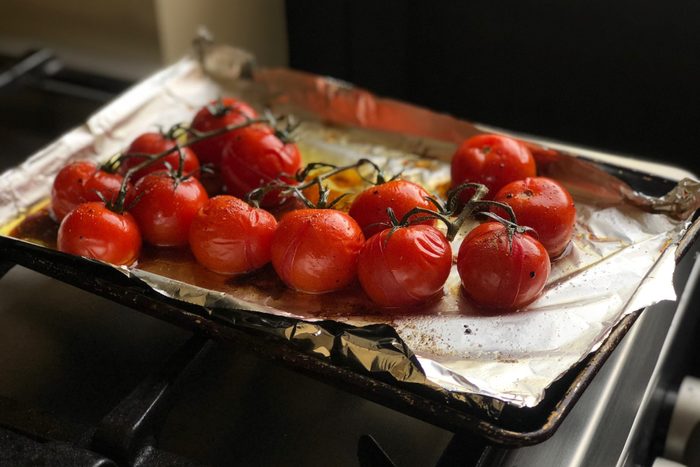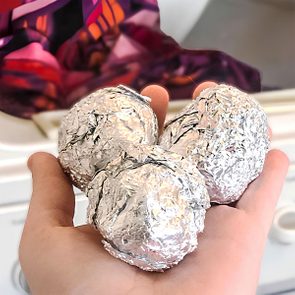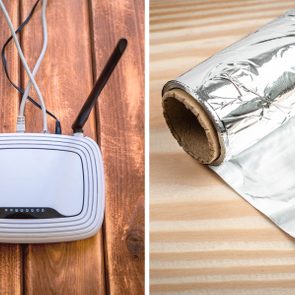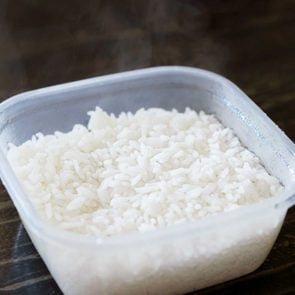Is It Safe to Cook with Aluminum Foil?
Updated: Jun. 02, 2024

While cooking with aluminum foil is convenient, some reports suggest it's toxic. Here's what food-safety experts say.
Aluminum foil is one of the handiest tools in our kitchen, especially when it comes to making cleanup easier and faster. After all, you can just put it under foods while roasting or baking them, then toss it in the garbage without having to worry about scrubbing off stuck-on messes. But is aluminum foil toxic, as some reports suggest?
“Aluminum is found throughout nature in various forms,” says Martin Bucknavage, a Senior Extension Program Specialist in Food Safety and Quality at Penn State’s Department of Food Science. “It can naturally be found in various foods and in water, but it can also be added to food from additives or through preparation.”
Of course, just because something is “natural,” it doesn’t necessarily make it good for us. Does using aluminum foil in the air fryer or in the oven take us over the edge of safe consumption, or is that just a myth? In addition to Bucknavage, we spoke to experts from the FDA and a cookbook author skilled in cooking with aluminum foil to learn the best and safest ways to use it.
Get Reader’s Digest’s Read Up newsletter for more knowledge, humor, cleaning, travel, tech and fun facts all week long.
What are the potential dangers of cooking with aluminum foil?
The potential dangers stem from the idea that during cooking, tiny pieces of metal are transferred from the foil to your food—and therefore enter your body. According to the CDC, some studies have found a correlation between the oral intake of aluminum and the development of Alzheimer’s disease, but others have found the opposite. In the end, there isn’t enough evidence to point one way or the other. The CDC also notes that there is evidence that children who have kidney disease (which increases the storage of aluminum in the body) can develop brain and bone disease as a result of high aluminum intake.
These issues are compounded by the fact that some foods seem to absorb aluminum more than others. One study published in Food Science & Nutrition in 2019 looked at the amount of aluminum transfer when baking 11 different foods for 40 minutes at 425 degrees. The highest aluminum increase was in the samples of salmon, mackerel and duck breast.
How concerned are experts about these dangers?
Perhaps surprisingly, experts aren’t overly concerned. “Studies show that while there is some leaching of aluminum from foil to food during the cooking process, the level is very low—nothing the body cannot normally handle,” says Bucknavage. Plus, aluminum is everywhere, as we mentioned earlier. It’s the most abundant mineral in the earth’s crust, and it’s used to build everything from cars and planes to roofs, pipes and cutlery. It’s also found naturally in some plant-based foods, such as spinach and potatoes.
“Aluminum compounds have been used in consumer products such as antacids, astringents, buffered aspirin, food ingredients and antiperspirants for many years,” notes an official we spoke to from the Food and Drug Administration (FDA). “An adult eats about 7 to 9 milligrams of aluminum per day in their food. The amount of aluminum ingested in antacids can be as much as 200 milligrams per tablet. Levels of exposure to aluminum compounds from foods cooked in aluminum pots and pans are generally very low when compared to the levels found in the diet from natural sources and consumer products.”
Is aluminum foil toxic when heated?
And can you put aluminum foil in the oven? While small amounts of aluminum transfer to food during cooking—aka when heated—some studies show that aluminum can be transferred from a can to the food in it without any heat involved. That said, heat does seem to play a bigger role.
“The amount of heat and the type of food do have an impact,” notes Bucknavage. “As heat increases, so does the potential level of transfer, and this is also impacted by the food, including fish. So fish cooked in foil will have the potential for more leaching compared to a sandwich wrapped in foil for a few hours.”
Is it safer to use aluminum foil at certain temperatures?
According to Bucknavage, you likely aren’t cooking your food at temperatures high enough to have a significant impact on the amount of aluminum that is transferred. Instead, the temperature you use for cooking will have a larger effect on the quality of your finished product. “Food would be burnt to a crisp before the foil melts, but in general, 450 degrees Fahrenheit is about the highest temperature you’d want to use,” says Julia Rutland, a culinary professional and the author of Foil Pack Dinners.
Indeed, Reynolds Wrap, one of the leading manufacturers of aluminum foil, doesn’t even give a maximum recommended cooking temperature for their aluminum foil, but they do for their parchment paper and butcher paper.
Which side of aluminum foil is potentially toxic?
When it comes to aluminum-foil toxicity, there is no difference between the shiny side and the dull side. If you are using it for cooking, Rutland says that your concern should not be which side of the foil is in contact with your food, but which type of foil you are using. “The important thing to remember is to use heavy-duty foil when cooking, especially for foil packs,” she says. “Regular or traditional foil is very thin, and edges of food will pierce holes in it.”
If you’re still concerned about toxicity or sticking, go with Rutland’s preferred foil. “My favorite is heavy-duty nonstick,” she says. “It is coated in food-grade silicone, which resists sticking. It also reduces any reaction acidic foods will have against regular aluminum. This nonstick coating is always on the dull side on this type of foil.”
What are the other issues with using aluminum foil in the oven?
Aluminum foil can make baking and roasting easier, but other issues can arise. These include:
- Foil that sticks to food. If you’re baking things for a while with foil, you run the risk of them sticking and even getting tiny pieces of foil caught in the bottoms of the treats. “For fast-baking cookies, I use either foil or parchment paper, but for treats like meringues that bake longer, I prefer parchment,” says Rutland.
- Soggy baked potatoes. Foil traps moisture, so a potato that’s baked while wrapped in foil is going to have a soft, soggy texture. Meanwhile, a baked potato that’s not wrapped will have a crispier skin.
- A metallic taste. Unless you use heavy-duty nonstick foil, as Rutland suggests above, highly acidic foods (like tomatoes, citrus and vinegar) and high-salt foods will cause an additional reaction with aluminum foil that can give your food a metallic taste. It’s best to use an unlined pan for these.
What can you use for cooking instead of aluminum foil?
If you’re still worried that aluminum foil could be toxic, or you have a personal or family history with the health conditions noted above, opt for parchment paper. It’s typically just as effective as aluminum foil for baking. When it comes to cooking, a combination of parchment and aluminum foil might be the way to go.
“You can get all the benefits of foil-pack cooking if you first wrap the food in parchment, then in foil,” Rutland says. “Many of the recipes in my book can be cooked in parchment, but it has to be well sealed and placed on a rimmed baking sheet, because juices might leak out.” And if you’re cooking in a foil pack on the grill, she adds, definitely don’t skip the foil on the outside, as the parchment paper could burn without it.
For storing leftovers or wrapping sandwiches, you may want to consider wax paper over foil. Wax paper will protect the food from the air and won’t stick either. Discover which types of safe cookware ensure your family’s safety and make your food delicious in every cooking scenario.
About the experts
- Martin Bucknavage is a Senior Food Safety Extension Associate and Team Lead for Industrial Food Safety and Quality at Penn State’s Department of Food Science. He is a certified food scientist and a Food Safety Preventive Controls Alliance instructor in Food Safety Modernization Act Preventive Controls for Human and Animal Food.
- Food and Drug Administration: We connected with officials at the U.S. Food and Drug Administration (FDA) who compiled the latest data and advice on cooking with aluminum foil.
- Julia Rutland is a culinary professional, recipe developer and former food editor. She is the author of Foil Pack Dinners: 100 Delicious, Quick-Prep Recipes for the Grill and Oven.
Sources:
- Interview with Martin Bucknavage, Senior Food Safety Extension Associate and Team Lead for Industrial Food Safety and Quality at Penn State’s Department of Food Science, November 2023
- Interview with an FDA official, November 2023
- Interview with Julia Rutland, culinary professional and author of Foil Pack Dinners, November 2023
- Centers for Disease Control and Prevention Agency for Toxic Substances and Disease Registry: “Public Health Statement for Aluminum”
- Food Science & Nutrition: “Aluminum contamination of food during culinary preparation: Case study with aluminum foil and consumers’ preferences”
- Reynolds Brand: “The Ultimate Aluminum Foil and Cooking Papers Guide”























